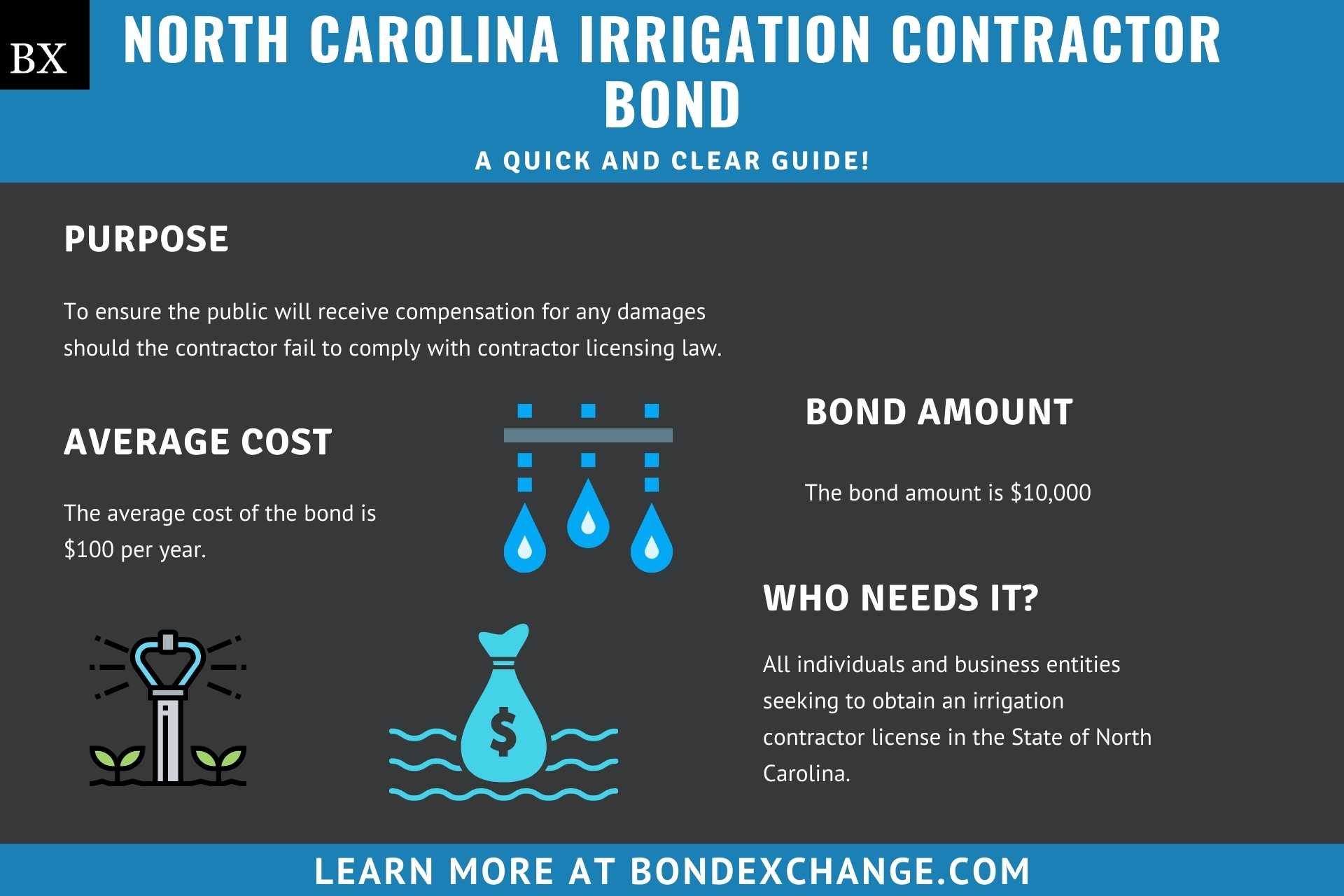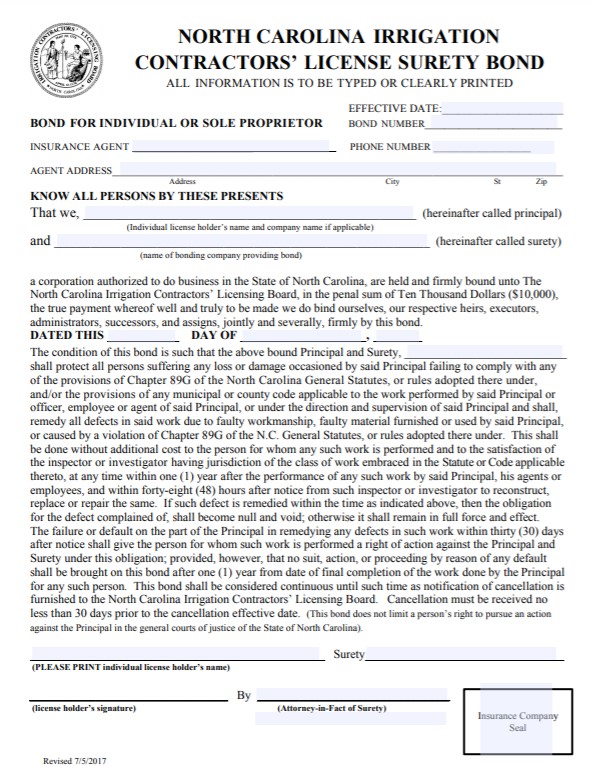North Carolina Irrigation Contractor Bond: A Comprehensive Guide
February 8, 2021

This guide provides information for insurance agents to help contractors on North Carolina Irrigation Contractor Bonds
At a Glance:
- Average Cost: $100 per year
- Bond Amount: $10,000
- Who Needs It: All individuals and business entities seeking to obtain an irrigation contractor license in the State of North Carolina
- Purpose: To ensure the public will receive compensation for any damages should the contractor fail to comply with contractor licensing law
- Who Regulates Irrigation Contractors in North Carolina: The North Carolina Irrigation Contractors Licensing Board (ICLB)
Background
North Carolina General Statute 89G-2 requires irrigation contractors operating in the state to obtain a license with the ICLB. The North Carolina legislature enacted the licensing laws and regulations to ensure that contractors engage in ethical business practices. In order to provide financial security for the enforcement of the licensing law, contractors must either deposit cash or purchase and maintain a $10,000 irrigation contractor surety bond to be eligible for licensure.
What is the Purpose of the North Carolina Irrigation Contractor Bond?
North Carolina requires contractors to purchase the Irrigation Contractor Bond as part of the application process to obtain an Irrigation contractor license. The bond ensures that the public will receive compensation for financial harm if the contractor fails to comply with the licensing regulations. In short, the bond is a type of insurance that protects the public if the contractor breaks licensing laws.
How Can an Insurance Agent Obtain a North Carolina Irrigation Contractor Surety Bond?
BondExchange makes obtaining a North Carolina Irrigation Contractor Bond easy. Simply login to your account and use our keyword search to find the “contractor” bond in our database. Don’t have a login? Enroll now and let us help you satisfy your customers’ needs. Our friendly underwriting staff is available by phone (800) 438-1162, email or chat from 7:30 AM to 7:00 PM EST to assist you.
At BondExchange, our 40 years of experience, leading technology, and access to markets ensures that we have the knowledge and resources to provide your clients with fast and friendly service whether obtaining quotes or issuing bonds.
Is a Credit Check Required for the North Carolina Irrigation Contractor Bond?
No, a credit check is not required for the North Carolina Irrigation Contractor Bond. Because this bond is considered relatively low-risk, the same low rate is offered to all irrigation contractors in North Carolina.
How Much Does the North Carolina Irrigation Contractor Bond Cost?
The $10,000 North Carolina Irrigation Contractor bond costs just $100 per year
How Does North Carolina Define “Irrigation Contractor”?
North Carolina General Statute 89G-1 defines an irrigation contractor as “any person who, for compensation or other consideration, constructs, installs, expands, services, or repairs irrigation systems.”
How Do Irrigation Contractors Apply for a License in North Carolina?
Contractors in North Carolina must navigate several steps to secure their irrigation contractor license. Below are the general guidelines, but contractors should refer to the ICLB’s instructions page for details on the process.
License Period – The North Carolina Irrigation Contractor License expires on December 31 of each year and must be renewed before the expiration date
Step 1 – Meet the Experience Requirements
Applicants for an irrigation contractor license must have a minimum of three years of irrigation-related field experience prior to applying for a license
Step 2 – Choose Your Intended Licensing Process
Applicants to become a licensed irrigation contractor in North Carolina must demonstrate to the ICLB that they are capable of handling the day to day operations of their business. The ICLB allows contractors to apply for licensure through the following means:
-
- Examination: Contractors may choose to apply for licensure through examination. The exam consists of 160 multiple choice questions and contractors must receive a score of 64% or higher to pass. More information on the licensing exam can be found here. Contractors must pay a $310 exam fee.
- Reciprocity: Contractors who are currently licensed in a state with similar licensing requirements to North Carolina may apply for a license through reciprocity. Contractors must complete a 10 question questionnaire testing their knowledge of North Carolina state law. Contractors must pay a $250 reciprocity fee.
- CIC Certification: Contractors who have completed the CIC through the Irrigation association on or after 11/20/2009 are exempt from taking the licensure exam. Contractors must complete a 10 question questionnaire testing their knowledge of North Carolina state law and pay a $200 exam fee
Step 3 – Determine the License Type
North Carolina requires contractors to obtain specific licenses corresponding to the nature in which the contractor’s business operates. Below are the different types of the North Carolina Irrigation Contractor License:
-
- Irrigation Contractor: Should be completed by individual contractors applying for licensure by examination, reciprocity, or to qualify for licensure through having taken the CIC
- Corporate Irrigation Contractor: Should be completed by contractors whose business entity is either a corporation, LLC, or partnership. All corporate irrigation contractors must have at least one member of their organization be individually licensed
Step 4 – Register Your Business Entity
Contractors whose business entities are not sole proprietorships must register their business with the North Carolina Secretary of State
Step 5 – Purchase a Surety Bond or Deposit Cash
Contractors must deposit cash or purchase and maintain a $10,000 irrigation contractor surety bond
Step 6 – Complete the Application
All irrigation contractor regulatory license applications should be mailed to:
North Carolina Irrigation Contractors’ Licensing Board
Post Office Box 41421
Raleigh NC 27629-1421
Contractors must complete the application corresponding to their specific license type, including the following steps:
6.a Reference Form – Contractors must obtain three references who can vouch for their character. At least one reference must be a licensed contractor. All references must complete a Confidential Reference Form and independently submit to the ICLB.
6.b Experience Verification – Contractors must complete and submit both a Client Verification Form and Employer Verification Form with their license application. These forms serve to verify the contractor’s experience.
6.c Fee – Contractors are required to submit a $100 application fee with their license application
Step 7 – Pass the Exam
Contractors applying for their license by examination must pass the required exam after submitting their application. Information on how to register for and take the licensure exam can be found here
How Does a North Carolina Irrigation Contractor Renew Their License?
Prior to the license expiration date, the ICLB will send all irrigation contractors an email containing instructions on how to renew their license online. Contractors must complete 10 hours of continuing education each renewal period. The North Carolina Irrigation Contractor License expires on December 31 of each year and must be renewed before the expiration date.
What Are the Insurance Requirements for the North Carolina Irrigation Contractor License?
The State of North Carolina does not require irrigation contractors to purchase any form of liability insurance. Irrigation contractors will need to deposit cash or purchase and maintain a $10,000 surety bond.
How Do North Carolina Irrigation Contractors File Their Bond?
Contractors should mail the completed bond form, including the power of attorney, to the following address:
North Carolina Irrigation Contractors’ Licensing Board
Post Office Box 41421
Raleigh NC 27629-1421
The irrigation contractor surety bond requires signatures from both the surety company that issues the bond and the contractor. The surety company should include the following information on the bond form:
- Name, phone number, and address of the insurance agent issuing the bond
- Legal name of the entity/individual(s) buying the bond
- Surety company’s name
- Date the bond is signed
What Can Contractors Do to Avoid Claims Against the North Carolina Irrigation Contractor Bond?
To avoid claims on the Irrigation Contractor Bond, contractors must follow all license regulations in the state, including some of the most important issues below that tend to cause claims:
- Do not engage in any acts of fraud
- Do not commit any acts of gross malpractice or incompetence
What Other Insurance Products Can Agents Offer Irrigation Contractors in North Carolina?
North Carolina does not require irrigation contractors to obtain any form of liability insurance. However, most reputable contractors will purchase this insurance anyway. Bonds are our only business at BondExchange, so we do not issue liability insurance, but our agents often utilize brokers for this specific line of business. A list of brokers in this space can be found here.
How Can Insurance Agents Prospect for North Carolina Irrigation Contractor Customers?
North Carolina conveniently provides a public database to search for active irrigation contractors in the state. The database can be accessed here. Contact BondExchange for additional marketing resources. Agents can also leverage our print-mail relationships for discounted mailing services.
What other Contractor License Bonds are Required in North Carolina?
Contractors in North Carolina will need to obtain specific bonds correlating with their license type. Below are all the different contractor licensing bonds required by the State of North Carolina:
- Statement of Bonding Ability
- Landscape Contractor: $10,000 bond limit



